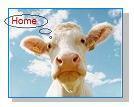|
Know yourself and help yourselfArticle submission, Saturday 6th January 2007
Let’s begin the New Year with once again understanding the basics of good health and clear up some misunderstanding about our body and its requirements. As we all know energy comes from food, and so carbohydrates, proteins, fats and alcohol - all that make our food are all used up to provide us with energy. Fats provide twice as much as carbohydrates and alcohol quite near to twice as much energy. So obviously when you consume same amount of carbohydrate as fat, calories coming from fat are more and same is the case with drinking alcoholic beverages.
Simply put, if energy intake should exceed the amount of energy we burn it is stored in our body as fat, and this does not happen over night but rather it usually takes lots of extra chips, cakes and coffee’s, not forgetting the alcohol to make you overweight It is this unhealthy eating process over a long period that causes obesity.
Then how will you know how much calories are needed? There are some bodily functions for which you body needs energy even in a state of rest, for example for the heart to keep beating, liver to regenerate cells, kidneys to filter and all such involuntary functions need energy. BASAL METABOLIC RATE comes into the picture as it is the rate at which your body uses energy to maintain the basic functions to keep us alive. So under any given condition your body will need a minimum amount of energy to function (so forget crash dieting when you take less energy than your BMR you are damaging your body and hindering the basic bodily processes).
The amount of energy needed is dependent on: AGE Calculate your BMR as follows:
Approximate activity level values:
Example: a 30 year old, 75 kg lightly active women needs: (8.3x75) + 846 =1468.5 x 1.4=2055.9 calories per day [above calculations are an approximate values; consult a dietitian to plan to your specific needs depending on all factors] But you can definitely check your BMI from the chart below, which lets you know if you are overweight or healthy BMI= weight (KG)/height(m)x(m) = kg/mxm (m= height in meters) example: 70kg /1.62m x 1.62m = 26.7 BMI here is 26 so therefore person falls into the overweight category.
Many factors contribute to weight gain but primarily intake must exceed the expenditure for weight gain to occur. What ever your calorie requirement is, reducing just 500 calories a day will help you loose approx 400-500grams [1lb] of weight per week without feeling deprived or tired. Eating too few calories in order to loose weight quickly damages your health. Instead opt for some exercise by doing moderate exercise for 30-40 minutes thrice a week is good enough to help you loose a further 300-400gms of fat and also build muscle which helps to increase your BMR.
How to get the maximum benefit from your exercise To get maximum fat burning benefit simply you need to achieve a heart rate between 60-80 percent of your maximum heart rate. This maximum heart rate has to be maintained for 20min at least thrice a week or a brisk walk for 30-40 minutes daily will suffice.
To check if your walking speed is right do a quick sing –talk test, you should not be able to sing but a few words is ok. To measure whether your heart is in your target heart rate zone take you pulse before and after your exercise [these days there are a number of machines which show the heart rate] for 10 seconds then multiply with 6 to get the pulse for a minute. MHR [Maximum heart rate] = 220 - age [example - for a person aged 32 it will be 220 - 32 = 188] When exercise is done within the maximum heart rate zone it is highly beneficial.
Above information is given in good faith however for any diseased condition please consult physician or dietitian before starting it. Your questions and suggestions are welcome at: renashukla@bigpond.com.
Cut through all the dietary myths and discover a workable solution to your weight management and control.

|




